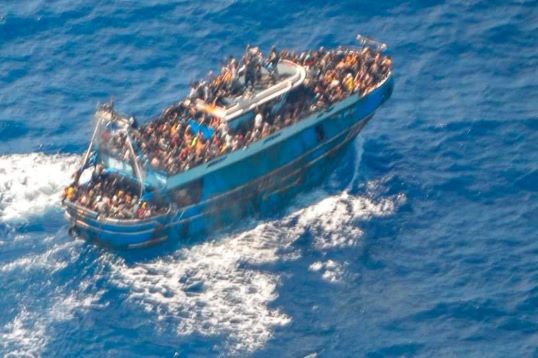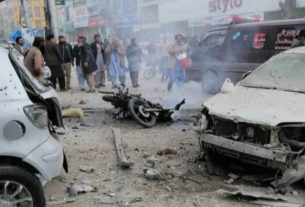“There is nothing to be worried about. Whether they’re 12 or 18 years old, we take guys of these ages too.”
A people smuggler in Quetta, who arranges illegal routes out of Pakistan, is explaining his business model to an undercover BBC journalist. For 2.5m Pakistani rupees ($9000; £7,500), a young man can arrive in Europe “safe and sound” in approximately three weeks, he says, by crossing the border into Iran on foot and then travelling by road via Turkey to Italy. His tone is reassuring.
“He should keep snacks. He should definitely carry good quality shoes, and two or three sets of clothes. That’s it. He can buy water from Quetta. He will call upon reaching Quetta and a guy will come and receive him.”
The smuggler – Azam – claims hundreds of migrants cross the Pakistan border into Iran every day. He downplays the risks to our reporter, who is posing as a man wanting to bring his brother to the UK.
With inflation soaring in the country and the Pakistani rupee plummeting in value, many people are looking to move. Pakistani authorities have told the BBC nearly 13,000 people left Pakistan to go to Libya or Egypt in the first six months of 2023, compared with close to 7,000 in the whole of 2022.
Often the journeys they take are dangerous. In June, hundreds of migrants died after a cramped fishing vessel sank off the coast of Greece. At least 350 Pakistanis were thought to be on board.
“Even if he gets caught [along the way], he is only going to end up back at home. No-one is going to kidnap him and ask for ransom,” Azam says.
But migrants who attempt to travel via Libya can fall prey to militias and criminal gangs. One Pakistani man we spoke to, who used a people smuggler to travel to Italy, says he was kidnapped and imprisoned for three months in Libya.
Saeed (not his real name) says he was only released after his family paid a ransom of $2,500 (£2,000).
‘DM for game’
Many smugglers are operating in plain sight on mainstream social media platforms like Facebook and TikTok – through accounts that have tens of thousands of followers.
Since May, the BBC has been monitoring social media accounts promoting illegal migration routes. We have found that the smugglers’ tactics are concealed by a web of euphemisms that enable them to sidestep content moderation and law enforcement. They arrange trips and payments privately via direct messages and WhatsApp.
Code words like “dunki” and “game” are used to promote illegal routes to Europe. “Dunki” refers to boat crossings and “game” describes the journeys that migrants will take from start to finish.
The three most common routes from Pakistan transit through Turkey, Iran or Libya before reaching their final destination in Europe.
Since the Greek migrant boat disaster, people smugglers we monitored have been increasingly promoting “taxi games” – shorthand for routes by road through Eastern Europe – as the favoured smuggling method.
Smugglers’ social media accounts post videos of groups of migrants hiding in woods and running into minivans, with agents’ names and mobile phone numbers superimposed on top. On WhatsApp, customers and “agents” exchange messages about the next “game” in group chats with hundreds of members.
Azam specialises in “taxi games”, claiming they are safer than sea routes. But there are risks to those land routes too.
The UNHCR – the UN’s refugee agency – says freezing temperatures in winter as migrants attempt to cross borders on foot, as well as road accidents, have resulted in deaths.
Five other smugglers we spoke to also recommended “taxi routes”. One said he could get someone to the UK from France for £1,000 ($1,228).
We put our evidence to Meta, which owns Facebook and WhatsApp, and TikTok – that their platforms are being used to promote illegal people smuggling.
Meta took down all links to the Facebook groups and pages we flagged to them, but did not take down the profiles attached to them. It did not remove WhatsApp groups, because its policy of end-to-end encryption protects privacy and does not allow for moderation.
TikTok took down the links to the accounts we alerted them to. It says the company “has zero tolerance for content that facilitates human smuggling” and “removed accounts and content that violate their policies”.
‘Journey of death’
Saeed left his town in Pakistani-administered Kashmir almost a year ago because of a lack of employment opportunities for young men in his area – and clashes along the border with Indian-administered Kashmir. He lived very close to the Line of Control – the de facto border between India and Pakistan in the contested region – but has been in Italy for 10 months.
He says he was influenced to come to Europe by a combination of TikTok videos he saw online and by a friend who had left Pakistan a few months before him.
“I heard that it’s very simple to come here and it would take about 15-20 days. But it was all a lie. It took me more than seven months,” he says.
Saeed is awaiting the outcome of his asylum claim in Italy and says he now regrets taking the illegal route, calling it “a journey of death”. But he regularly posts videos on TikTok of his new life in Italy.
A few clips document his route from Pakistan, mostly showing an excited young man on his journey. These upbeat videos follow a TikTok trend which many young Pakistani men like him, who arrive in Europe, have participated in.
In one video captioned “Pakistan to Libya”, a friend he travelled with films them both, selfie-style, sitting on a plane, smiling.
He says that it’s “just a form of art” to post videos like this and argues they are “not a true reflection of society”.
Two weeks after our undercover journalist first contacts the smuggler, we call him again – this time revealing we are BBC journalists.
When we challenge Azam about the dangers of the illegal routes he is promoting, he hangs up.__BBC.com





